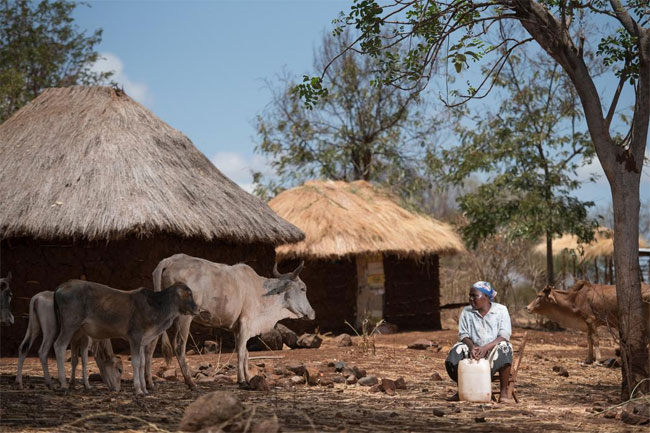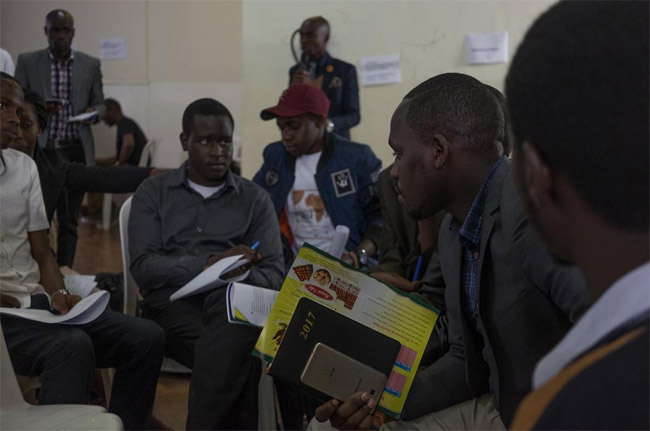Do you believe that not only is this farmer programming applications to deal with drought
The article is a story on Rajiv Golla's Motherboard, who had a visit to Kenyan in a hackathon, full of surprises and admiration.
- Drunken Tesla engineer had a great private company
- In the end, big universities realized that Java was a lousy language if used for introductory programming
I attended the hackathon in Eldoret, Kenya to see how the "homegrown" technologies here worked after all the solutions bought from abroad failed.
Kenya is facing one of the worst droughts in history. The wells were shallow, the cattle were too thin to eat or sell, and the conflict was booming between the herdsmen. The corn, the main food crop here, was the hardest hit. In February, President Uhuru Kenyatta announced a national disaster with 2.6 million people in need of food aid, following a persistent drought since 2014.

Long drought in Kenya
But when driving to Eldoret, a town in western Kenya, known for its milk and corn production and athletes winning the Olympics, everything is hard to imagine. This city of 290,000 has escaped the drought. The hills surrounding the road are covered with lots of trees and corn stalks spread in all directions until the center of town. The biggest highlight here is the upcoming August elections. The street is full of election posters and trucks with political slogans. As a land that accounts for 75% of Kenya's agricultural sector, the leading candidate for mayor, a dairy cowboy, has taken a dairy cow as his election symbol.
When I came to Eldoret to attend Hack4Farming, a hackathon attracted more than 100 people including 40 competitors from all over Kenya. With the drought spreading, they have targeted their efforts to revolutionize Kenyan agriculture. Some young Kenyan experts want to invest in small-scale gardening equipment, looking for the latest technology for their farms. Among them is Patricia Lagat, a medical student with endless passion for fruits. "Don't call us farmers", she glares at me. "I am part of Horticultural Value Chain" (roughly translated: agricultural value chain). Lagat has made a clear distinction between traditional agriculture and agribusiness, including every stage from farming to semi-finished products, from production to consumption. Her application, Kuza, connects users with a range of manufacturers to provide the latest information on agricultural prices and farming practices. By bringing farmers into this network, Lagat believes that she can make agriculture a more attractive industry with greater efficiency.

Some members attended Hack4Farming in Kenya
A number of other projects are highly regarded by the judges as a GPS platform to help farmers find the nearest feed and fertilizer supplier, a "Uber" model to rent idle farm equipment. idle and a personal record keeping application for cattle to prevent inbreeding.
Agriculture accounts for about 30% of Kenya's GDP, and such potential innovations make agriculture more profitable and efficient, especially for families who earn less than $ 10 a day. Arnold Bundotich, an astronomy student with a 5-acre corn farm, said: "He just had a bit of trouble in growing food crops, but had more trouble selling produce." And the main problem in Kenya is not farming but commercialization of agriculture.
Local and national governments have invested a lot of effort and money to find solutions to this problem. Besides help, projects from abroad, the applications presented at hackathon can be a good signal. Because many technologies provided by foreign companies cannot be applied in this country, because they are too cumbersome, not suitable for small, simple farms, accounting for more than 70% of farms in Kenya. .
But the "homegrown" technologies presented in Eldoret may be more useful than foreign technologies because they are created from Kenyan farms. Lagat won with Kuza by providing various information and alternatives such as the number of minutes to call, driving to the market in the town. The second winner is Maye Edwin, who created FarmAssist to address the demand for growth charts, for urban farm owners, such as Lagat. The open source application provides statistics on daily milk production, monitoring of cow reproduction and facilitating communication between a urban-based farmer and people who actually work in the field, More integrated SMS system is being used.
The products offered by Eldoret all have very strong competitors in the Kenyan market. There are several names such as:
- Cowsoko, an online cattle e-commerce website, has had more than 10,000 users since 2015 and is planning to expand to neighboring countries.
- Sokopepe has also done the same way to eliminate intermediaries in production, linking farmers directly to buyers, eliminating brokers and increasing the amount of money farmers receive directly for their products. .
- Kilimo Salama is a type of insurance to help small-scale farmers produce weather risks.
Immediately the Kenyan government has also adopted high technology in the fight against climate change, building an insurance program for affected cattle herders by satellite images of restricted grazing land. drought.
It can be seen that science and technology are now applied not only in industries, computer science, commerce, banking or something too high. An industry is also transforming itself and needs more investment in technology that is agriculture. Agriculture is becoming a huge way for developers who want to find a new goal and environment to prove their abilities. Thinking, if Vietnamese agriculture gets more attention, doing things like Kenya has done, then we will not have the crops that have been devalued, the agricultural products fall out on the streets, where the food is not finished, the place times did not come .
Hopefully, after this article, readers can find a good idea to contribute to the development of domestic agriculture (it sounds too far away !!).